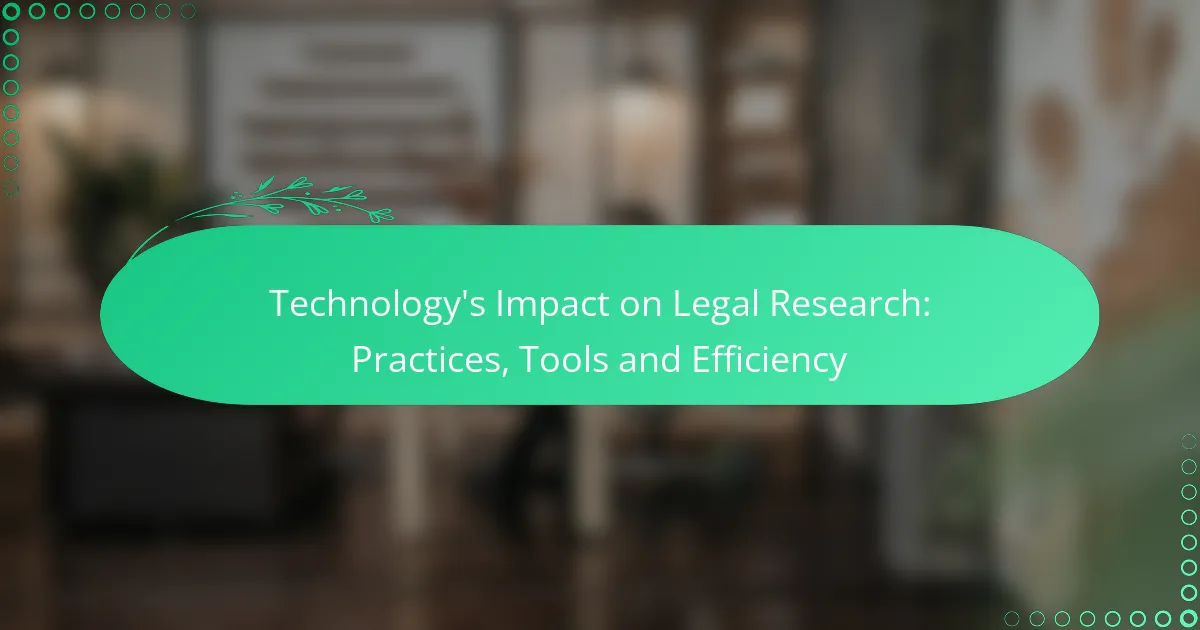Technology is revolutionizing legal research by providing legal professionals in the UK with faster access to information and more efficient analytical tools. This transformation not only streamlines the process of locating case law and statutes but also enhances the overall quality of legal services through improved accuracy and ease of use.

How is technology transforming legal research in the UK?
Technology is significantly enhancing legal research in the UK by providing faster access to information and more efficient tools for analysis. These advancements allow legal professionals to conduct thorough research with greater ease and accuracy, ultimately improving the quality of legal services.
Increased access to legal databases
The availability of online legal databases has revolutionized how legal professionals in the UK access case law, statutes, and legal commentary. Platforms like Westlaw and LexisNexis offer extensive collections of legal materials that can be searched quickly and efficiently.
Many databases now provide free access to certain legal resources, enabling smaller firms and individuals to conduct research without incurring high costs. This democratization of information supports a more equitable legal landscape.
Enhanced data analytics for case law
Data analytics tools are transforming case law research by allowing legal professionals to identify trends and patterns in judicial decisions. These tools can analyze large volumes of case data to predict outcomes based on historical rulings.
For example, analytics can reveal how often judges rule in favor of certain arguments or how specific legal precedents have been applied. This insight can guide lawyers in crafting more effective legal strategies.
AI-powered legal research tools
AI-powered tools are streamlining the legal research process by automating tasks such as document review and legal citation analysis. These tools can quickly sift through vast amounts of data to find relevant cases and statutes, saving time and reducing human error.
Examples include ROSS Intelligence and Casetext, which use natural language processing to understand legal queries and return precise results. Legal professionals can leverage these technologies to enhance their research efficiency.
Cloud-based collaboration platforms
Cloud-based platforms are facilitating collaboration among legal teams by allowing multiple users to access and edit documents in real time. Tools like Microsoft Teams and Google Workspace enable seamless communication and file sharing, which is essential for remote work environments.
These platforms also often include features for tracking changes and managing project timelines, making it easier for teams to stay organized and meet deadlines. Adopting cloud solutions can significantly improve workflow efficiency in legal practices.

What are the best legal research tools available?
The best legal research tools streamline the process of finding case law, statutes, and legal opinions, enhancing efficiency for legal professionals. Top tools include Westlaw UK, LexisNexis, Fastcase, and Ravel Law, each offering unique features and capabilities tailored to different research needs.
Westlaw UK
Westlaw UK is a leading legal research platform that provides access to a comprehensive database of UK case law, statutes, and legal commentary. It features advanced search capabilities, allowing users to filter results by jurisdiction, court level, and date, making it easier to find relevant information quickly.
One of its standout features is the KeyCite service, which helps users track the history and treatment of cases, ensuring they are relying on current and authoritative sources. Subscription costs can vary, typically falling within the mid to high range of legal research tools, depending on the features selected.
LexisNexis
LexisNexis is another prominent legal research tool, known for its extensive library of legal resources, including case law, statutes, and secondary sources. Its user-friendly interface and powerful search algorithms allow legal professionals to conduct thorough research efficiently.
LexisNexis also offers features like Lexis Answers, which provides quick answers to legal questions using AI technology. Pricing generally aligns with industry standards, often requiring a subscription that can be tailored to specific practice areas or needs.
Fastcase
Fastcase is an innovative legal research tool that emphasizes affordability and accessibility. It offers a robust database of case law, statutes, and regulations, making it a popular choice for solo practitioners and small firms looking for cost-effective solutions.
Fastcase’s unique visual search tools, such as the case law map, help users visualize connections between cases and legal concepts. Its pricing structure is typically lower than traditional platforms, often appealing to budget-conscious legal professionals.
Ravel Law
Ravel Law is designed to enhance legal research through data visualization and analytics. It provides insights into how judges have ruled on specific issues, allowing users to understand trends and patterns in judicial decisions.
The platform’s case law visualization tools enable users to see relationships between cases, which can be particularly useful for developing legal strategies. Ravel Law’s subscription model is competitive, appealing to firms looking to leverage data-driven insights in their research processes.

How can legal professionals improve research efficiency?
Legal professionals can enhance research efficiency by adopting advanced technologies and refining their research practices. Utilizing tools such as AI, automation, and advanced search techniques can significantly reduce time spent on legal research and improve accuracy.
Utilizing AI for predictive analytics
AI-driven predictive analytics can help legal professionals anticipate case outcomes based on historical data. By analyzing patterns in previous rulings, lawyers can make more informed decisions about case strategies and client advisement.
Implementing AI tools can streamline the research process, allowing professionals to quickly identify relevant precedents and legal principles. This not only saves time but also enhances the quality of legal arguments presented in court.
Implementing workflow automation tools
Workflow automation tools can significantly reduce repetitive tasks in legal research, such as document review and case tracking. By automating these processes, legal teams can focus on higher-value activities that require critical thinking and expertise.
Consider using platforms that integrate with existing legal databases to automate document generation and management. This can lead to faster turnaround times and improved accuracy in legal documentation.
Training on advanced search techniques
Training legal professionals on advanced search techniques can greatly enhance their research capabilities. Understanding how to use Boolean operators, filters, and specialized databases can lead to more effective and efficient searches.
Encouraging ongoing education in research methodologies can help legal teams stay current with evolving technologies and practices. Regular workshops or online courses can provide practical skills that translate directly into improved research outcomes.

What criteria should be considered when choosing legal research tools?
When selecting legal research tools, consider factors such as cost, database comprehensiveness, and user interface. These criteria can significantly impact the efficiency and effectiveness of your legal research process.
Cost and subscription models
Cost is a crucial factor when evaluating legal research tools. Many platforms offer various subscription models, including monthly, annual, or pay-per-use options. Assess your budget and the expected return on investment to determine the best fit for your needs.
Some tools may provide free trials or tiered pricing based on features, which can help you gauge their value before committing. Be cautious of hidden fees or additional costs for advanced features that may not be immediately apparent.
Database comprehensiveness
The comprehensiveness of a database directly affects the quality of legal research. Ensure the tool covers a wide range of legal materials, including case law, statutes, regulations, and secondary sources relevant to your jurisdiction. A robust database can save time and improve the accuracy of your findings.
Check for updates and the frequency of new content additions, as staying current with legal developments is essential. Tools that aggregate information from multiple sources may provide a more holistic view of the legal landscape.
User interface and experience
A user-friendly interface enhances the efficiency of legal research. Look for tools that offer intuitive navigation, clear categorization, and effective search functionalities. A well-designed user experience can reduce the learning curve and allow for quicker access to relevant information.
Consider features such as customizable dashboards, advanced filtering options, and mobile accessibility. Testing the interface through demos or trials can help you determine if it meets your workflow needs and preferences.

What are the emerging trends in legal research technology?
Emerging trends in legal research technology focus on enhancing efficiency and accuracy through advanced tools and methodologies. Key developments include the integration of machine learning, the use of cloud-based platforms, and the adoption of data analytics to streamline legal workflows.
Integration of machine learning
The integration of machine learning in legal research technology significantly improves the ability to analyze vast amounts of data quickly. Machine learning algorithms can identify patterns, predict outcomes, and assist in document review, making the research process more efficient.
For instance, tools that utilize natural language processing can help lawyers find relevant case law or statutes based on context rather than exact keyword matches. This capability reduces the time spent on research, often cutting it down to a matter of minutes instead of hours.
When implementing machine learning tools, it’s crucial to ensure that the algorithms are trained on high-quality, diverse datasets to avoid biases. Regular updates and training can help maintain accuracy and relevance in legal research outputs.
